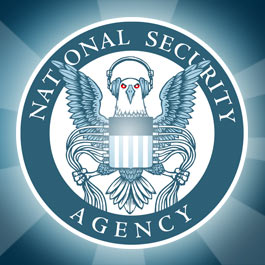| |
In our 641st issue:
In most issues of EFFector, we give an overview of all the
work we're doing at EFF right now. This week, we’re taking a deep dive
into a single issue: new revelations of a massive domestic surveillance
program leaked to the Guardian and Washington Post.
 Last night, we received confirmation from a report in the Guardian
that the National Security Agency (NSA) is currently collecting the
call records of every Verizon customer in America. The NSA order forces
Verizon to provide "on an ongoing daily basis" all call records for any
call "wholly within the United States, including local telephone calls”
and any call made "between the United States and abroad."
Last night, we received confirmation from a report in the Guardian
that the National Security Agency (NSA) is currently collecting the
call records of every Verizon customer in America. The NSA order forces
Verizon to provide "on an ongoing daily basis" all call records for any
call "wholly within the United States, including local telephone calls”
and any call made "between the United States and abroad."
And that’s not all. Today, the Washington Post and the Guardian
published reports based on information provided by a career
intelligence officer showing how the NSA and the FBI are tapping
directly into the central servers of nine leading U.S. Internet
companies. The government is extracting audio, video, photographs,
e-mails, documents, and connection logs that enable analysts to track a
person’s movements and contacts
over time.
Mounting Evidence of the NSA Warrantless Surveillance
EFF has so much evidence of the surveillance now that we've created a timeline.
In brief, America first learned about the secret surveillance in a 2005 New York Times exposé
which disclosed one aspect of the NSA’s domestic surveillance program.
We learned that the Bush Administration had been illegally tapping phone
lines in the U.S. without warrants or court permission immediately
following the 9/11 attacks. President Bush himself admitted at least
some of what the government was doing.
In early 2006, EFF received photos and blueprints
from former AT&T technician Mark Klein. These undisputed documents
show that AT&T installed a fiberoptic splitter at its facility in
San Francisco which sends copies of all AT&T customers’ emails, web
browsing, and other Internet traffic to the NSA.
Later in 2006, USA Today and a number of other newspapers published
a story disclosing that the NSA had compiled a massive database of call
records from American telecommunications companies, which included
AT&T, Verizon, and Bell South. This was confirmed by a number of
members of Congress.
Information has continued to trickle out over time. In 2009, the New York Times reported the NSA was still collecting purely domestic communications in a "significant and systematic" way after the FISA Amendments Act was passed in 2008.
Section 215 of the Patriot Act and Verizon
The news of the last few days has confirmed the records portion
of the surveillance, and gave us some additional hints about the
government’s arguments in support of its actions. The secret court
order issued to Verizon was a Section 215 order (50 U.S.C. sec. 1861), a
controversial legal instrument greatly expanded when George Bush signed
the USA PATRIOT Act into law on October 26, 2001. It allows the
government to seek "any tangible things" in connection with an
authorized investigation and is often known as the "business records"
provision of FISA.
 Section 215 allows for secret court orders to records that are
"relevant" to a government investigation – a far lower threshold and
more expansive reach than a warrant based on probable cause. The list
of possible "tangible things" the government can obtain is seemingly
limitless, and could include everything from driver’s license records to
Internet browsing history.
Section 215 allows for secret court orders to records that are
"relevant" to a government investigation – a far lower threshold and
more expansive reach than a warrant based on probable cause. The list
of possible "tangible things" the government can obtain is seemingly
limitless, and could include everything from driver’s license records to
Internet browsing history.
We've long suspected that the government has been using Section
215 to conduct dragnet surveillance. Now we have incontrovertible
evidence. Senator Ron Wyden has warned that "when the American people
find out how their government has secretly interpreted the Patriot Act,
they will be stunned and they will be angry."
Senator Wyden is right.
What EFF is Doing
First of all, we're leading the charge to stop the NSA’s
domestic surveillance program in the courts. Since 2006, EFF has
challenged the NSA surveillance in two landmark lawsuits, Hepting v. AT&T and Jewel v. NSA.
These cases, in which we represent AT&T customers, include both the
wiretapping claims arising from the fiberoptic splitter that Mark Klein
found and the scooping up of communications records referred to in the
Verizon order. We also have fought back against other PATRIOT Act
surveillance abuses, including bringing a case that resulted in National
Security Letters being declared unconstitutional -- which is currently on appeal to the Ninth Circuit.
We’re also fighting for transparency. In 2011, we filed a FOIA
lawsuit against the Department of Justice for records about the
government’s secret interpretation of Section 215. Last week we submitted a brief to the secret FISA court itself in that case.
And we're pushing for legislative reform. We've organized tens
of thousands of concerned citizens to speak out against the surveillance
powers in the PATRIOT Act and the FISA Amendments Act, and now we’re
calling on the public to demand a full, public accounting of the
government's surveillance programs.
Join the Fight
We're asking individuals to email Congress right away to tell
them in the strongest possible terms that you do not consent to dragnet
domestic surveillance. Tell your elected officials that you object to
this mass domestic spying program. Demand that they initiate a
full-scale, public investigation immediately with the results of the
investigation made public as much as possible. Demand that the public
officials responsible for this program are held to account. Click here to speak out now.

And we’re also asking individuals to support our work. Become an EFF member today and join the fight to defend fundamental liberties in the digital world.
Learn more
NSA Spying Overview
Timeline of NSA Spying
Frequently Asked Questions
State Secrets Privilege
Washington Post story on Internet surveillance
Guardian story on Internet surveillance
Guardian story on phone record surveillance
Supported by Members
Our members make it possible for EFF to bring legal and
technological expertise into crucial battles about online rights.
Whether defending free speech online or challenging unconstitutional
surveillance, your participation makes a difference. Every donation
gives technology users who value freedom online a stronger voice and
more formidable advocate.
If you aren't already, please consider becoming an EFF member today.
Donate Today
Administrivia
Editor: Rainey Reitman, Activist
editor@eff.org
EFFector is a publication of the Electronic Frontier Foundation.
eff.org
Membership & donation queries: membership@eff.org
General EFF, legal, policy, or online resources queries: info@eff.org
Reproduction of this publication in electronic media is encouraged. MiniLinks do not necessarily represent the views of EFF.
Back issues of EFFector |
|
No comments:
Post a Comment